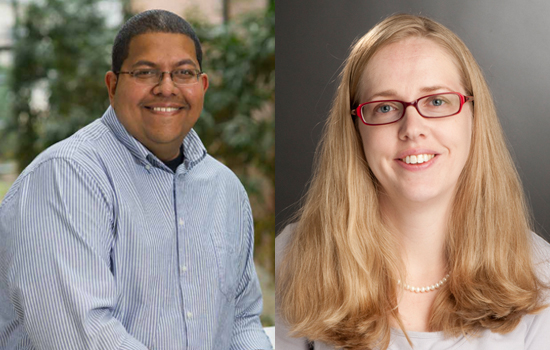RIT joins research experience program
National Science Foundation-funded program designed to open minds to careers in research
Reynold Bailey and Cecilia Ovesdotter Alm
Undergraduate students from around the country will try their hand at research as part of an upcoming Research Experience for Undergraduates (REU) at Rochester Institute of Technology. The REU Site in Computational Sensing is funded by a nearly $360,000 grant from the National Science Foundation.
The three-year program, starting in May, will allow 10 undergraduate students to attend a 10-week program at RIT each summer.
Students will be challenged to make better sense of the human experience. They will do this by gathering and analyzing data on human behaviors and cognitive processes using sensing technology, such as facial expression trackers and natural language processing.
“We hope to foster a new generation of scientists who approach research questions differently,” said Cecilia Ovesdotter Alm, an assistant professor of English at RIT and Principal Investigator of the REU. “This will be a transdisciplinary experience, and students will explore complementary perspectives and integrate methodologies and analysis tools in creative ways.”
The goal of the experience is not merely to break new ground in the field of computational sensing, but to help a diverse group of students develop a passion for performing research.
“In addition to blending computer science and liberal arts, we are trying to reach an unusually diverse student group of underrepresented subpopulations in research, including women and students with disabilities,” said Reynold Bailey, an associate professor of computer science at RIT and co-PI of the REU. “For this REU, the majority will be in the minority.”
Students will work in teams to complete a research project throughout the program. Projects vary from developing techniques for monitoring a user’s stress, attention and cognitive load in real-time to using methods from computational linguistics for analysis of interpersonal violence, considering social media data and other information sources.
“Traditionally, sensors for collecting data from humans were understood as physiological measurements, such as a heart rate,” said Alm. “In contrast, we envision sensing in broader, new ways, as time-evolving measurable data linked to individuals and, by extension, to their communities. In addition to physiological measurements, we will study sensing data that may involve language, social media footprints, emotional-creative reactions, environmental signals and more.”
Research in computational sensing has valuable implications for many fields, including human-computer interaction, accessibility, health and wellbeing and gaming.
Throughout the experience, students will work with an interdisciplinary team of RIT faculty:
- Sandy Baldwin, Trent Hergenrader, Emily Prud’hommeaux, Laura Shackelford, Babak Elahi and Cecilia Ovesdotter Alm from RIT’s College of Liberal Arts
- Joe Geigel, Anne Haake, Christopher Homan, Linwei Wang, Qi Yu and Reynold Bailey from RIT’s B. Thomas Golisano College of Computing and Information Sciences
- Ray Ptucha from RIT’s Kate Gleason College of Engineering
- Clarence Sheffield Jr. from RIT’s School of Individualized Study and the College of Imaging Arts and Sciences
At the end of the summer, students will present their projects at RIT’s annual Undergraduate Research Symposium. In addition to experiencing how to conduct research, students will attend career-oriented workshops and other activities, such as an informal course that focuses on research skills and on applying to and preparing for graduate school.
The NSF-funded REU program is designed to open U.S. students’ minds to graduate school and build life-long capabilities for continued research careers. The NSF is currently funding 80 Computer and Information Science and Engineering REU sites across the country.










